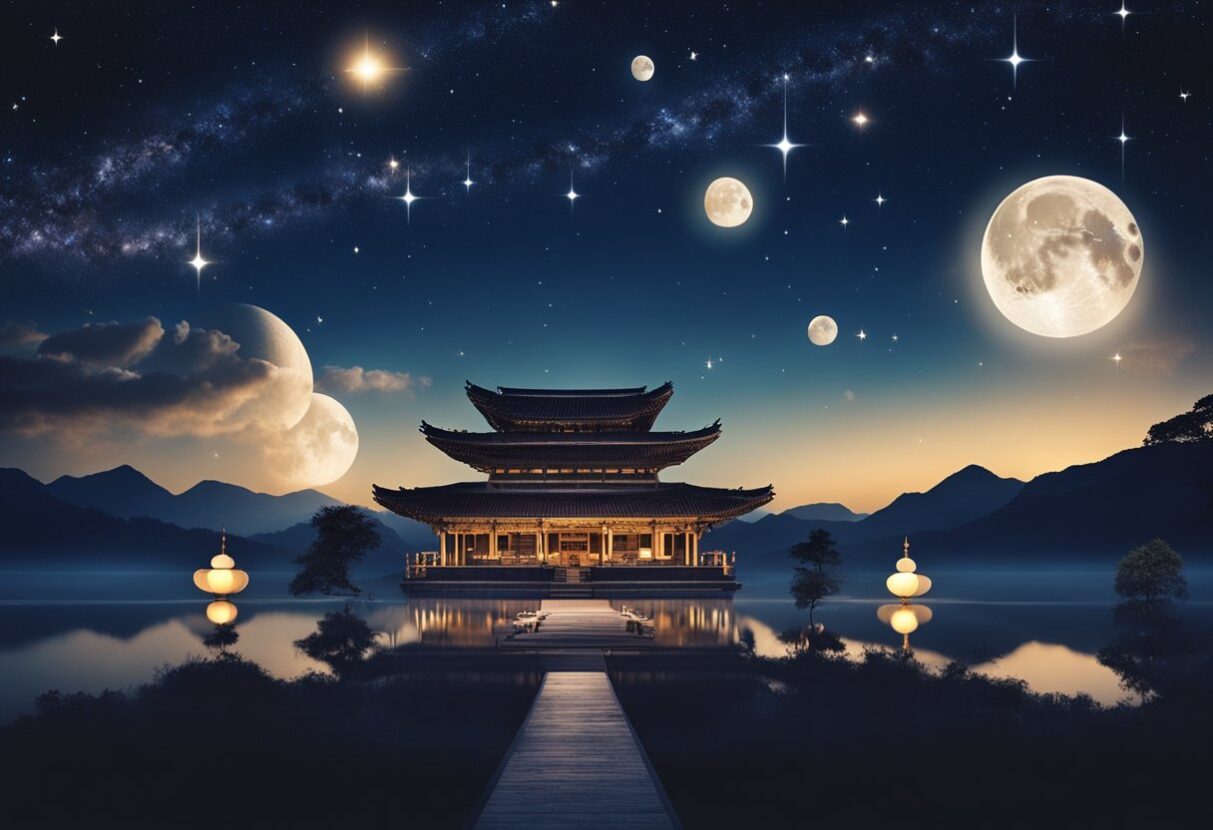Dreaming About The Moon: Meanings And Interpretations
Understanding Moon Dreams
If you’ve ever had a dream about the moon, you might be wondering what it could mean. Dreams about the moon can be mysterious and intriguing, and they can often provide insights into your emotional state, your intuition, and your subconscious mind. In this section, we’ll explore the different aspects of moon dreams, including their symbolism, interpretations, and phases.
Symbolism of the Moon
The moon is a powerful symbol in many cultures, representing feminine energy, creativity, and emotional well-being. In astrology, the moon is associated with the unconscious mind, while the sun represents the conscious mind. Dreams about the moon can reflect your emotional state, your relationship with your inner self, and your instinctual nature.
Interpreting Moon Dreams
Interpreting moon dreams can be challenging, as they can have many different meanings depending on the context of the dream and the individual’s personal experiences. However, there are some common interpretations that can provide insights into the symbolism of the moon in dreams. For example, a full moon dream can represent completion, fulfillment, and abundance, while a crescent moon dream can symbolize new beginnings, transformation, and change.
Moon Phases and Their Meanings
The different phases of the moon can also have different meanings in dreams. A waxing moon dream can represent growth, development, and progress, while a waning moon dream can symbolize release, letting go, and surrender. Dreams about the new moon can indicate a need for introspection and reflection, while dreams about the full moon can suggest a need for emotional expression and release.
In conclusion, moon dreams can be a powerful tool for gaining insights into your emotional state, intuition, and subconscious mind. By understanding the symbolism of the moon, interpreting the meanings of your dreams, and exploring the different phases of the moon, you can gain valuable insights into your inner world and navigate the challenges and changes of life with greater wisdom and clarity.
Cultural Perspectives on Moon Dreams

Moon dreams have long been a topic of fascination across different cultures and mythologies. In this section, we will explore the cultural perspectives on moon dreams and how they have been interpreted throughout history.
Moon Dreams in Different Cultures
The moon has been revered as a symbol of feminine energy in many cultures, and this is reflected in the interpretation of moon dreams. In Chinese culture, the moon represents yin, the feminine principle, and is associated with emotions, intuition, and creativity. Dreams about the moon in Chinese culture are believed to signify changes in one’s emotional state or relationships.
In Japanese culture, the moon is also associated with femininity and is seen as a symbol of beauty and elegance. Dreams about the moon in Japanese culture are believed to represent a longing for love or a desire for emotional fulfilment.
In Egyptian culture, the moon was associated with the goddess Isis, who was believed to be the mother of all creation. Dreams about the moon in ancient Egyptian culture were seen as a sign of spiritual awakening or enlightenment.
Mythology and Moon Dreams
Moon dreams have also been interpreted in various mythologies. In Greek mythology, the moon was associated with the goddess Artemis, who was the protector of women and childbirth. Dreams about the moon in Greek mythology were seen as a sign of protection or guidance from the goddess.
In literature, the moon has been used as a symbol of transformation and change. For example, in Shakespeare’s play “A Midsummer Night’s Dream,” the moon is associated with the changing of the seasons and the transformation of love.
Overall, moon dreams are believed to represent the innermost feelings, instincts, and intuition of the dreamer. Whether viewed through the lens of culture or mythology, the moon remains a powerful symbol of emotional and spiritual growth.
Moon Dreams and Personal Growth
Moon dreams can offer valuable insights into your inner world and aspirations. By exploring the symbolism and meanings behind these dreams, you can gain a deeper understanding of your changing moods, aspirations, and personal experiences.
Emotional Insights from Moon Dreams
Moon dreams can provide emotional insights into your unconscious mind. The moon’s changing phases can represent the cyclical nature of life and personal development. For example, a full moon can symbolize growth and progress, while a new moon can represent new projects or self-reflection.
Moon dreams can also offer insights into your changing emotions and desires. For instance, dreaming of a crescent moon can represent reconciliation or care, while a full moon can symbolize love or serenity.
Moon Dreams and Life Transitions
Moon dreams can also reflect important life transitions and personal growth. For example, dreaming of a waxing moon can represent personal development or self-awareness, while a waning moon can symbolize letting go of old habits or beliefs.
The moon’s association with abundance and growth can also reflect new opportunities or projects in your life. Dreaming of a bright, full moon can represent a time of growth and progress, while a dark moon can symbolize a need for introspection or rest.
In conclusion, exploring the symbolism and meanings behind moon dreams can provide valuable insights into your emotional well-being, personal growth, and spiritual development. By paying attention to your dreams and interpreting their messages, you can gain a deeper understanding of your inner world and aspirations.
Astrological Insights

Astrology and Moon Dreams
In astrology, the moon represents our emotions, intuition, and inner self. It is known to have a significant impact on our behaviour and moods. Therefore, it is no surprise that the moon often appears in our dreams, symbolizing our emotional state and hidden truths.
Dreams featuring the moon can provide insight into our subconscious mind and reveal our deepest thoughts and feelings. For example, a waning moon in a dream may signify introspection and self-reflection, while a full moon may represent illumination and manifestation of our desires.
Lunar Eclipses and Blood Moons in Dreams
The occurrence of a lunar eclipse or blood moon in a dream may hold significant spiritual and astrological meaning. In astrology, a lunar eclipse represents a time of transformation and change, while a blood moon symbolizes passion and intensity.
Dreaming about a lunar eclipse or blood moon may indicate that a significant change is about to occur in your life, or that you are experiencing a surge of intense emotions. It may also be a sign that you need to let go of old patterns and behaviours to make way for new growth and transformation.
In numerology, seeing the angel number 222 may also be significant in relation to moon dreams, as it represents balance and harmony. This could indicate that you need to find balance in your emotional state and align your inner self with your outer actions.
Overall, astrology can provide valuable insights into the meaning of moon dreams and the symbolism behind lunar events. By understanding the astrological significance of the moon and its phases, you can gain a deeper understanding of your dreams and the messages they hold.
Practical Aspects of Dream Analysis

Dreams can offer valuable insights into our subconscious mind and can provide hidden messages that can lead to self-discovery and personal growth. Here are some practical aspects of dream analysis that can help you interpret the meaning of your moon dreams.
Recording and Reflecting on Moon Dreams
The first step in analyzing your moon dreams is to record them in a dream journal. This can help you remember the details of your dream and reflect on its meaning. When recording your dream, be sure to include as much detail as possible, such as the phase of the moon (new moon, crescent moon, full moon), the colour of the moon, the presence of moonlight, and any other relevant details.
After recording your dream, take some time to reflect on its meaning. Consider the emotions you felt during the dream and any symbols or themes that stood out to you. You may also want to explore any personal associations you have with the moon, such as its connection to fertility, nurturing, or imagination.
Common Themes in Moon Dreams
Moon dreams can have a variety of meanings depending on the context and symbols present in the dream. However, there are some common themes that often appear in moon dreams. Here are a few examples:
Transition period: The moon is often associated with transitions, such as the transition from one phase of life to another. If you dream of the moon during a time of change in your life, it may be a sign that you are moving towards a new phase of personal growth.
Nurture and fertility: The moon is also associated with nurturing and fertility, particularly in its full moon phase. If you dream of the full moon, it may be a sign that you are ready to nurture a new project or relationship.
Hidden messages: Moon dreams can also contain hidden messages that are not immediately clear. Pay attention to any symbols or themes that appear in your dream, as they may hold clues to your subconscious thoughts and emotions.
By recording and reflecting on your moon dreams, you can gain a deeper understanding of your inner self and higher wisdom. Whether your moon dream is a sign of danger or a symbol of creativity, it can provide valuable insights into your emotional well-being and spiritual growth.







